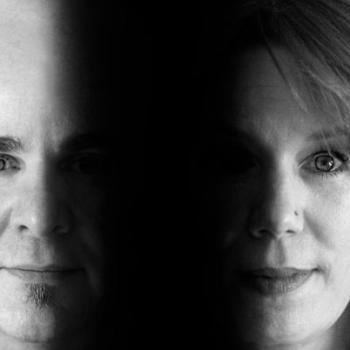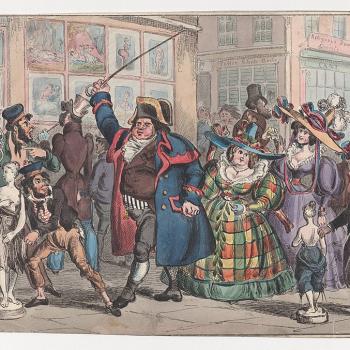The Vayeitzei portion opens with a terrified Jacob fleeing his home after tricking his brother, Esau, out of Esau's birthright blessing. On the run, near the border of Israel, Jacob stops to rest and dreams of a ladder. Jacob's ladder is an intensely evocative image; it is an image begging to be metaphor, a prophecy asking for a prophet.
A ladder was set earthward and its top reached heavenward; and behold! Angels of God were ascending and descending on it. And behold! God was standing over him and God said "I am God, the God of Abraham, and the God of Isaac; the ground upon which you are lying, to you will I give it and to your descendants . . . I am with you; I will guard you wherever you go, and I will return you to this soil."
Jacob awoke from his sleep and said, "Surely, God is present in this place and I did not know it." (Genesis 28:12-16)
Traditional commentaries see the angels as representing anything from reborn human souls coming down to earth and the souls of the dying ascending to the heavens (Philo) to angels assigned to Israel returning to their posts while the angels assigned to Haran venture forth to protect Jacob as he leaves the physical boundary of Israel (Rashi). While the angels dominate the imagery of the prophecy, the most curious element of the text is in Jacob's reaction to his vision: how could he have not known that God was present in this place? Jacob's father and grandfather received revelations almost identical to this one, minus the ladder. Rashi, in making sense of this moment of discontinuity, downplays Jacob's response by limiting his ignorance to the holiness of that particular slice of ground. If Jacob knew it was a holy place, he would not have slept on those holy rocks.
The question of Jacob's ignorance changes whether one emphasizes God's presence or God's presence in "this place," as Rashi attempts to do by narrowing "this place" to the literal physical space occupied by Jacob's sleeping body. An emphasis on place, albeit a less literal one then Rashi's, brings up the relationship between God and place in the ancient world. At that time, cities, by and large, had their own deities. When visiting a particular city, the pious citizen brought a sacrifice at the local temple to the local god who had jurisdiction. In this dream, dreamt on the border between Israel and the rest of the world, God comes to Jacob to affirm that God abides by no borders; God is a universal God, a God who is there for all people, in all places, and whose angels roam the entirety of the earth. My God is a Universal God, this I did not know, Jacob said.
Alternatively, Jeffery Cohen, in Jewish Bible Quarterly, places his emphasis on God's presence. For Cohen, this prophetic dream is Jacob's first independent communication with God. Jacob's ignorance of God's presence is due to the difference between hearing about God (even from reliable sources such as Abraham and Isaac) and finally getting the chance to hear God's immediate voice, to have what may be referred to as a "personal" relationship with God. God appeared to me and now I am certain of God's presence in my life, Jacob said.
Regardless if the emphasis is on the relationship between God and Jacob, or God and the land, the prophecy of Jacob's ladder is a new spiritual beginning for Jacob.
God is not the God I knew, Jacob said.
12/1/2011 5:00:00 AM





